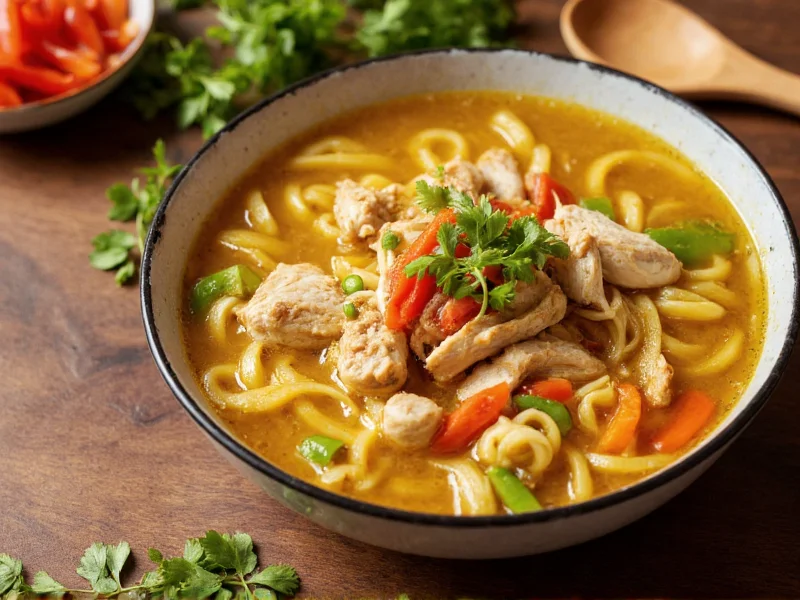When exploring authentic Vietnamese cuisine, few dishes capture the regional diversity better than chicken noodle soup with yellow noodles. Unlike the rice noodle-based pho that has gained international fame, this variation showcases Central and Southern Vietnam's culinary traditions with its distinctive golden-hued broth and springy egg noodles. The dish represents Vietnam's regional culinary diversity, where Central Vietnam's Mi Quang features turmeric-infused broth with minimal liquid, while Southern Vietnam's Hu Tieu Ga offers a clearer chicken broth with generous noodle portions.
Understanding Vietnamese Yellow Noodle Soups
The confusion between different Vietnamese noodle soups often stems from regional variations and translation differences. What Westerners commonly refer to as "Vietnamese chicken noodle soup with yellow noodles" typically corresponds to two distinct dishes depending on the region:
| Dish Name | Region | Noodle Type | Broth Characteristics | Key Ingredients |
|---|---|---|---|---|
| Mi Quang | Central Vietnam | Wide, flat yellow egg noodles | Minimal broth, turmeric-infused | Chicken or pork, shrimp, peanuts, rice crackers |
| Hu Tieu Ga | Southern Vietnam | Thin to medium yellow wheat noodles | Clear chicken broth | Chicken, pork, bean sprouts, garlic |
Authentic Mi Quang Chicken Recipe
For those seeking an authentic Vietnamese chicken noodle soup experience with yellow noodles, Mi Quang represents the most traditional preparation. This Central Vietnamese specialty features turmeric-colored egg noodles in a light broth with chicken, shrimp, and various toppings. The dish's vibrant yellow color comes from turmeric, not food coloring, giving it both visual appeal and subtle earthy flavor.
Essential Ingredients
The foundation of a perfect Vietnamese chicken noodle soup with yellow noodles rests on these key components:
- Yellow noodles: Fresh or dried mi noodles (egg noodles with turmeric)
- Chicken broth: Made from chicken bones, ginger, and aromatics
- Turmeric: Freshly ground or high-quality powder for color and flavor
- Protein: Chicken thigh or breast, sometimes with shrimp
- Toppings: Fried shallots, crushed peanuts, rice crackers, fresh herbs
Step-by-Step Preparation
Creating an authentic vietnamese yellow noodle soup requires attention to detail in both broth preparation and noodle handling:
- Prepare the broth: Simmer chicken bones with ginger, onion, and salt for 2-3 hours. Strain thoroughly.
- Color the broth: Mix turmeric powder with a small amount of broth to create a smooth paste, then incorporate into the main broth.
- Cook the noodles: Blanch fresh yellow noodles in boiling water for 30-60 seconds, then rinse in cold water.
- Prepare toppings: Cook chicken until tender, slice thinly. Prepare fresh herbs, bean sprouts, and other accompaniments.
- Assemble: Place noodles in bowl, arrange chicken on top, pour just enough hot broth to moisten (Mi Quang uses minimal broth), and add toppings.
Regional Variations and Authenticity Tips
Understanding the differences between Central and Southern Vietnamese preparations helps achieve authentic results when making vietnamese chicken noodle soup with yellow noodles. Central Vietnam's Mi Quang traditionally uses less broth and more emphasis on the turmeric-infused noodles, while Southern Hu Tieu Ga features a clearer broth with more liquid.
For the most traditional vietnamese yellow noodle soup experience, consider these authenticity tips:
- Noodle selection: Look for "mi" or "hu tieu" noodles specifically labeled for Vietnamese cuisine
- Turmeric quality: Use fresh turmeric root when possible for superior flavor and color
- Broth clarity: Skim impurities during simmering for a clean-tasting broth
- Herb selection: Include culantro (ngo gai) alongside more familiar cilantro for authentic flavor
- Serving style: Mi Quang is traditionally served with minimal broth, almost like a noodle salad with soup
Common Mistakes to Avoid
Many home cooks encounter challenges when preparing vietnamese chicken noodle soup with yellow noodles. Understanding these pitfalls ensures better results:
- Overcooking noodles: Yellow egg noodles become mushy quickly - blanch just until pliable
- Insufficient turmeric: The broth should have a vibrant yellow color, not pale yellow
- Using rice noodles: True yellow noodle versions require wheat-based egg noodles
- Overpowering broth: Avoid adding too many spices that mask the delicate chicken flavor
- Incorrect noodle-to-broth ratio: Mi Quang uses minimal broth while Hu Tieu Ga has more liquid
Serving and Enjoyment
The traditional way to enjoy vietnamese chicken noodle soup with yellow noodles involves interactive dining. Diners typically add fresh herbs, bean sprouts, lime juice, and chili to customize their bowl. The crunch of rice crackers (banh trang) added just before eating provides textural contrast to the soft noodles and tender chicken.
For optimal enjoyment of homemade vietnamese yellow noodle soup, serve immediately after assembly while the broth is piping hot. The dish is best consumed fresh, as the noodles can become overly soft if left sitting in the broth too long. In Vietnam, this soup commonly appears as a breakfast or lunch dish, often enjoyed at street-side eateries where the preparation happens quickly before your eyes.











 浙公网安备
33010002000092号
浙公网安备
33010002000092号 浙B2-20120091-4
浙B2-20120091-4